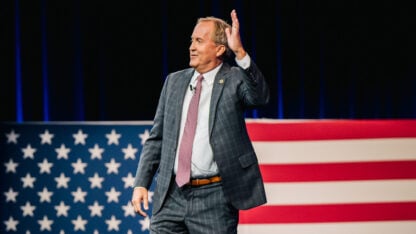Republicans in Georgia’s state Senate have added police as a protected class to proposed hate crimes legislation deemed essential by state leaders, complicating chances of its passage by lobbing a political grenade into the belly of the bill with little time left in the legislative session.
The Senate Judiciary Committee on Friday night approved a hate crimes bill passed by the state House over a year ago but added “first responders” as a protected class alongside race, color, religion, national origin, sexual orientation, gender or disability.
“It’s imperative that we support our law enforcement personnel that puts their life on the line for us, just as we do these other classes, categories, groups, of individuals,” said Republican Sen. Bill Cowsert of Athens, who introduced the change.
Democrats on the panel spoke against it.
“If we want to talk about further protections for law enforcement, we would be amenable to talking about those protections,” said Sen. Elena Parent, a Democrat from Atlanta. “But to put them in the same legislation as immutable characteristics misses the moment and is a slap in the face.”
Sen. Brian Strickland, a Republican from McDonough, said he initially supported passing the House bill with no changes, but said “I don’t know how we can take out first responders,” before voting in favor of the bill with first responders included.
Urgency to pass the legislation has grown after a 25-year-old black man named Ahmaud Arbery was pursued and killed in February near Brunswick. A white father and son are charged in his death. The pressure from business groups and others grew even further after the death of George Floyd in Minneapolis sparked nationwide protests over racial injustice and inequality.
“The time to act is now,” a group of organizations including the Georgia Chamber of Commerce, Metro Atlanta Chamber, Anti-Defamation League and the NAACP said in a statement Thursday.
But Friday’s maneuvering by the Senate throws a major wrench in the push to get it passed.
Rep. Chuck Efstration, a Republican from Dacula that sponsored the House version, would not commit to voting against the bill if it came back to the House with first responder protections, but said “bad faith on behalf of the Senate to fail to engage in a meaningful dialogue is notable,” accusing the chamber’s Republican leadership of trying to sabotage the bill.
“It’s incredibly important that this legislation be passed this year, and poison-pill amendments which are brought only for the purpose of causing division and causing Democrat opposition in order to ensure failure of the legislation is unacceptable,” Efstration said.
Rep. Calvin Smyre, a Democrat from Columbus and the longest serving member of the House, said “This is certainly something that we cannot live with and that we cannot support.”
The change comes after Republican Lt. Gov. Geoff Duncan, who presides over the Senate, proposed a version that would have included most of the House categories, but also age, ancestry, creed, culture, ethnicity, homelessness, sex, armed forces veteran status, having been involved in civil rights activities or having exercised rights protected by the U.S. Constitution’s First Amendment. That bill rolled onto the runway Thursday but promptly went back into the hangar and has not reappeared.
The state has remained one of four without such a law, as many conservatives have been cool to the idea. Cole Muzio is the executive director of the conservative group Family Policy Alliance of Georgia. He told the committee Thursday, before first responders had been added, that the bill wouldn’t save lives. “What it does do, is it does create thought crimes,” Muzio said. “And it does encourage us not to look at how we’re the same, not to look at how we’re all made in the image of God, but to look at how we’re the other.”
Sen. Harold Jones II, an Augusta Democrat who is one of three Democrats on the Senate Committee, said it was especially symbolic that Republicans took the action on Juneteenth.
“To do this, especially on Juneteenth, is just a spit in the face of what this bill is about and I think it’s cynical,” Jones said. “I think it’s done for political purposes. It cheapens it.”
Jones said he did not believe the language could be removed in negotiations between the House and Senate. “It’s not coming out in conference,” he said.
Jones, like several other opponents of the change, noted that Georgia lawmakers several years ago increased punishments for assaults against police officers in another law.
“We already have enough protection now for police officers,” Jones said.
For a deeper exploration of Ahmaud Arbery’s story, listen to WABE’s podcast, “Buried Truths.” Hosted by journalist, professor, and Pulitzer-prize-winning author Hank Klibanoff, season three of “Buried Truths” explores the Arbery murder and its direct ties to racially motivated murders of the past in Georgia.









